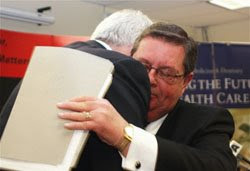
Pat Davis, right, thanks Dr. Anthony Jevnikar, who performed his kidney transplant in November 2007. Jevnikar has been named Wyeth Pharmaceuticals/ Canadian Institutes of Health Research Clinical Research Chair in Transplantation.
(Have an opinion on this article? Please enter your comments at the end of the post)By Heather Travis Western News - University of Western Ontario
Davis was a patient of Anthony (Tony) Jevnikar, named Wyeth Pharmaceuticals/ Canadian Institutes of Health Research Clinical Research Chair in Transplantation.
The announcement of the new $1.1 million chair was made on March 2.
“I was tired of being sick and tired of losing to my disease,” says Davis. His body quivered as he described the anguish of three failed kidney transplants, after which doctors informed him he no longer qualified for another due to the buildup of antibodies from various attempts. His immune system would likely reject any future transplant in spite of anti-rejection drugs.
Being “doomed to a life on dialysis” was more than Davis could bear.
“I thought about losing on my terms,” he says, meaning stopping dialysis so nature could take its course.
Davis had spent 20 years on dialysis machines and much of his life, including family time, was organized around treatments.
“I wasn’t like other dads,” he says. “I couldn’t run and play.”
Davis’ father and younger brother both died from kidney disease.
But a fateful meeting with Jevnikar, Medical Director of Kidney Transplantation at the London Health Sciences Centre’s University Hospital and professor in the Schulich School of Medicine & Dentistry, offered hope.
“While we accepted high-risk patients in the past, it’s fair to say Mr. Davis represented our biggest challenge,” says Jevnikar.
To prepare him for surgery, Jevnikar said “he was going to throw at me everything but the kitchen sink, and that too if necessary.”
Based on recent advances, a new, aggressive treatment would hopefully allow Davis’s immune system to accept the transplant. The donor was Davis’s wife, Donna.
Now, 16 months since the surgery in November 2007, “life for me is incredible and far beyond what I expected.”
Davis’s pre-surgery treatment was tailor-made to allow his body to accept the new kidney.
“We know kidneys ... are rejected by parts of the immune system,” Jevnikar says. “What Mr. Davis had was a unique combination of different ways to reject the organs, the kidneys, and that wasn’t well handled by the current anti-rejection drugs.”
As newly appointed clinical research chair in transplantation, Jevnikar says the funding will allow researchers to explore new ways to improve organ transplant longevity and to prevent damage to the transplant organs, as well as find new transplant solutions, such as Davis’s.
“Despite knowing the immune system the way we do and having drugs available, transplants aren’t forever and yet your organs are forever,” he says. “So, how do you prevent the injury that accompanies transplants so that organs – kidneys, livers, hearts - can function normally for the reasonable lifetime of that patient.”
About 170 organ transplants are performed each year at London Health Sciences Centre, 80-100 of which are kidneys.
“With each year, thanks to our advances in medical research, success rates are improving,” says Schulich School of Medicine & Dentistry Dean Carol Herbert. “What used to be a death sentence is now certainly a big bump in the road ... but in fact is manageable.”
Neil Maresky, vice-president of scientific affairs at Wyeth Pharmaceuticals, says the company believes transplantation is an important field of innovative medical research.
On behalf of the Canadian Institutes of Health Research, Quim Madrenas, Canada Research Chair in Transplantation and Immunology, congratulated Jevnikar.
“Organ rejection is one of the greatest challenges in transplantation research and Tony has made great progress in developing novel methods to prevent organ rejection and to improve the outcomes of organ transplantation.”
“You Have the Power to Save Lives – Sign Your Donor Card & Tell Your Loved Ones of Your Decision”
Register to be a donor in Ontario or Download Donor Cards from Trillium Gift of Life Network
For other Canadian provinces click here
In the United States, be sure to find out how to register in your state at ShareYourLife.org or Download Donor Cards from OrganDonor.Gov
In Great Britain, register at NHS Organ Donor Register
In Australia, register at Australian Organ Donor Register
Your generosity can save up to eight lives with heart, kidneys, liver, lungs, pancreas and small intestine transplants. One tissue donor can help up to 100 other people by donating skin, corneas, bone, tendon, ligaments and heart valves
No comments:
Post a Comment